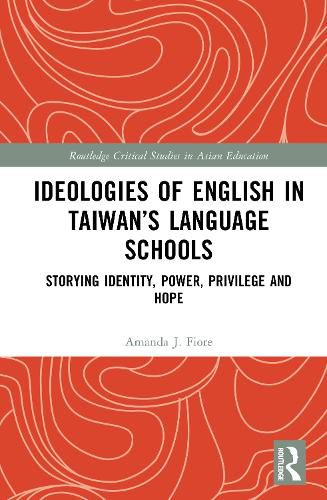Readings Newsletter
Become a Readings Member to make your shopping experience even easier.
Sign in or sign up for free!
You’re not far away from qualifying for FREE standard shipping within Australia
You’ve qualified for FREE standard shipping within Australia
The cart is loading…






This timely, critical book presents an accessible glimpse into the beliefs and ideologies of English that govern Taiwan's private language schools.
Drawing on the original analysis of over sixty hours of in-depth interviews with 43 teachers and students, as well as the author's personal experience teaching English in Asia, a combination of thematic analysis and storytelling are used to better understand the meaning of English in Taiwan, and its impact on Taiwanese and foreign teachers. Importantly, her findings extend current critical scholarship in the interdisciplinary fields of language and identity, critical race theory, and critical linguistics, to the specific context of Taiwan's private language schools, shining a light on hierarchies of race, nationality, and linguistic identity in these unique cross-cultural spaces. When viewed against the backdrop of Taiwan's "Bilingual by 2030" policy, and China's relations with Taiwan, these powerful beliefs about English and the West take on new meaning.
The author's book offers much needed insight into the belief systems and ideologies of English that create power and privilege in Taiwan's schools, thereby serving as a guide for academics, policymakers, teachers, students, and English school owners alike.
$9.00 standard shipping within Australia
FREE standard shipping within Australia for orders over $100.00
Express & International shipping calculated at checkout
This timely, critical book presents an accessible glimpse into the beliefs and ideologies of English that govern Taiwan's private language schools.
Drawing on the original analysis of over sixty hours of in-depth interviews with 43 teachers and students, as well as the author's personal experience teaching English in Asia, a combination of thematic analysis and storytelling are used to better understand the meaning of English in Taiwan, and its impact on Taiwanese and foreign teachers. Importantly, her findings extend current critical scholarship in the interdisciplinary fields of language and identity, critical race theory, and critical linguistics, to the specific context of Taiwan's private language schools, shining a light on hierarchies of race, nationality, and linguistic identity in these unique cross-cultural spaces. When viewed against the backdrop of Taiwan's "Bilingual by 2030" policy, and China's relations with Taiwan, these powerful beliefs about English and the West take on new meaning.
The author's book offers much needed insight into the belief systems and ideologies of English that create power and privilege in Taiwan's schools, thereby serving as a guide for academics, policymakers, teachers, students, and English school owners alike.